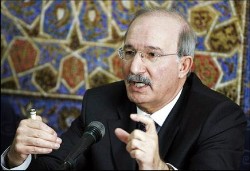Jordan, Egypt sign 23 cooperation accords
 Amman - Jordan and Egypt on Wednesday signed 23 agreements and memoranda of understanding to boost bilateral cooperation in commercial, investment, manpower, educational and information spheres.
Amman - Jordan and Egypt on Wednesday signed 23 agreements and memoranda of understanding to boost bilateral cooperation in commercial, investment, manpower, educational and information spheres.
The signing of the accords came at the end of an annual meeting of the Higher Jordanian-Egyptian Commission, which is co-chaired by the prime ministers of the two countries.
"Jordan and Egypt has several common factors, including open market and liberal policies, that make it imperative for them to boost bilateral cooperation so that they be able to face international economic blocs," Jordanian Prime Minister Nader Dahabi said during the concluding session.
He put the volume of bilateral trade between the two countries at 650 million dollars in 2007 and joint investments in the two states at about 600 million dollars.
Dahabi cited the Arab pipeline to supply Jordan, Syria and Lebanon and later European countries with Egyptian gas, and the regional link- up of power grids as two of the key projects binding the two countries.
Turning to politics, the Jordanian premier pointed out that the two countries played leading roles in efforts aimed at enabling the Palestinians and Israelis to reach a peace pact in accordance with the relevant UN resolutions and the Pan-Arab peace initiative.
He rebuked Israel for its adamant expansion of settlements in East Jerusalem, its practices in the West Bank and the siege of the Gaza Strip which he said "will not realize peace and security" for the Jewish state and other peoples of the region.
In his address, Egyptian Prime Minister Ahmed Nazif accused Israel of "foiling" Arab positive initiatives through its "stubborn attitudes" in dealing with peace efforts.
He cautioned against the emergence of "a political vacuum" as a result of the Palestinian division, the political situation in Israel and the transitional stage in the United States in the wake of the presidential election there.
Nazif urged "speedy and serious dialogue with the new US administration to ensure that it is going to play its necessary role to continue the peace process from the point it has reached." (dpa)